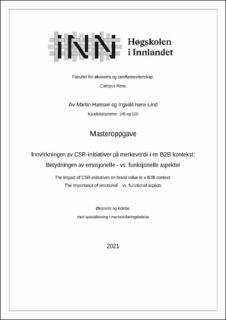Innvirkningen av CSR-initiativer på merkeverdi i en B2B kontekst: Betydningen av emosjonelle - vs. funksjonelle aspekter
Master thesis
Permanent lenke
https://hdl.handle.net/11250/2835138Utgivelsesdato
2021Metadata
Vis full innførselSammendrag
Mens tidligere forskning på CSR og merkeverdi hovedsakelig har fokusert på B2C markeder, er formålet med dette studiet å oppnå dypere innsikt i hvordan CSR-initiativer innvirker på merkeverdi i en B2B kontekst, med fokus på betydningen av emosjonelle – vs. funksjonelle aspekter. Eksisterende forskning innenfor B2B har hovedsakelig tatt for seg CSR som et helt konstrukt, og det etterlyses dermed en dypere forståelse av relevansen til emosjonelle – og funksjonelle aspekter ved et konkret CSR-initiativ i en B2B kontekst.
Studiet benytter et eksplorerende design som følge av at CSR og merkeverdi er lite utforsket innenfor B2B markeder. Studiet benytter seg av B2B aktøren SCHÜTZ Nordic som forskningskontekst, og SCHÜTZ Nordic sitt gjenvinningssystemet som et konkret CSR-initiativ. Som en konsekvens tar studiet utgangspunkt i et strategisk utvalg som inkluderer kunder av SCHÜTZ Nordic som har tilstrekkelig med informasjon og kunnskap om tematikken som studeres. Gjennom åtte semistrukturerte kundeintervjuer og to intervjuer med studiets referansegruppe blir tematikken ytterligere belyst.
Funnene i dette studiet indikerer at både emosjonelle – og funksjonelle aspekter er sentrale i B2B aktørers vurdering av CSR-initiativer, selv om informantene vektla ulike aspekter i ulik grad. Informantenes CSR engasjement og – begrepsforståelse kunne ved flere anledninger ses i sammenheng med informantenes vektlegging av de emosjonelle – og funksjonelle aspektene. Funnene viser imidlertid at det er en overvekt av funksjonelle aspekter som vektlegges, som peker mot at B2B aktører kan ses på som mer rasjonelle beslutningstakere. Til tross for dette vektla samtlige av informantene emosjonelle aspekter, som videre understreker viktigheten av å ikke undervurdere emosjonelle aspekter i B2B kontekster.
Studiet er begrenset til et konkret CSR-initiativ i en spesifikk forskningskontekst, som medfører at overføringsverdien trolig er størst for kontekster med liknende eller samsvarende omstendigheter. Fremtidig forskning kan videre utforske innvirkningen av mer filantropiske initiativer som donasjoner og veldedighet, og anvende ulike rammeverk for merkeverdi.
Ved å ta utgangspunkt i et konkret CSR-initiativ, er dette studiets bidrag til eksisterende litteratur å gi en dypere forståelse av hvordan et CSR-initiativ evalueres av B2B aktører, og illustrerer viktigheten av de emosjonelle – og funksjonelle aspektene. Studiets praktiske bidrag er å gi ledere og markedsførere en klarere forståelse av hvordan CSR-initiativer evalueres innenfor B2B, som tydeliggjør hvordan virksomheter bør kommunisere og formidle en virksomhets CSR-initiativer innenfor B2B, med et formål om å oppnå økt merkeverdi. While previous research on CSR and brand value mainly has focused on B2C markets, the purpose of this study is to gain deeper insight into how CSR-initiatives affect brand value in a B2B context, focusing on the importance of emotional – vs. functional aspects. Existing research within B2B has predominantly dealt with CSR as a whole construct, and thus calls for a deeper understanding of the relevance of emotional – and functional aspects of a specific CSR-initiative in a B2B context.
The study uses an exploratory design due to the relative scant exploration of CSR and brand value in B2B markets. The study uses the B2B actor SCHÜTZ Nordic as a research context, and SCHÜTZ Nordic's recycling system as a concrete CSR-initiative. As a consequence, the study is based on a strategic selection which includes customers of SCHÜTZ Nordic who have sufficient information and knowledge about the topics being studied. Through eight semi-structured customer interviews, and two interviews with the study's reference group, the topic is further given insight to.
The findings of this study indicate that both emotional and functional aspects are central in B2B actors assessment of CSR-initiatives, although the informants emphasized different aspects to varying degrees. The informants conceptual understanding of CSR and CSR involvement could on several occasions be seen in – connection with the informants emphasis on the emotional – and functional aspects. However, the findings show that there is a predominance of functional aspects that are emphasized, which indicates that B2B actors can be seen as more rational decision-makers. Despite this, all of the informants emphasized emotional aspects, which further emphasize the importance of not underestimating emotional aspects within B2B.
The study is limited to a specific CSR-initiative in a specific research context, which means that the transfer value is probably greatest for contexts with similar circumstances. Future research may further explore the impact of more philanthropic initiatives such as donations and charities, as well as applying different frameworks for brand value.
Based on a specific CSR-initiative, this study contributes to existing literature by providing a deeper understanding of how a CSR-initiative are evaluated by B2B actors and illustrates the importance of the emotional – and functional aspects. The study's practical contribution is to give managers and marketers a clearer understanding of how CSR-initiatives are evaluated within B2B, which clarifies how companies should communicate a company's CSR-initiatives within B2B, with an aim to achieve increased brand value.
Beskrivelse
Spesialisering i markedsføringsledelse
